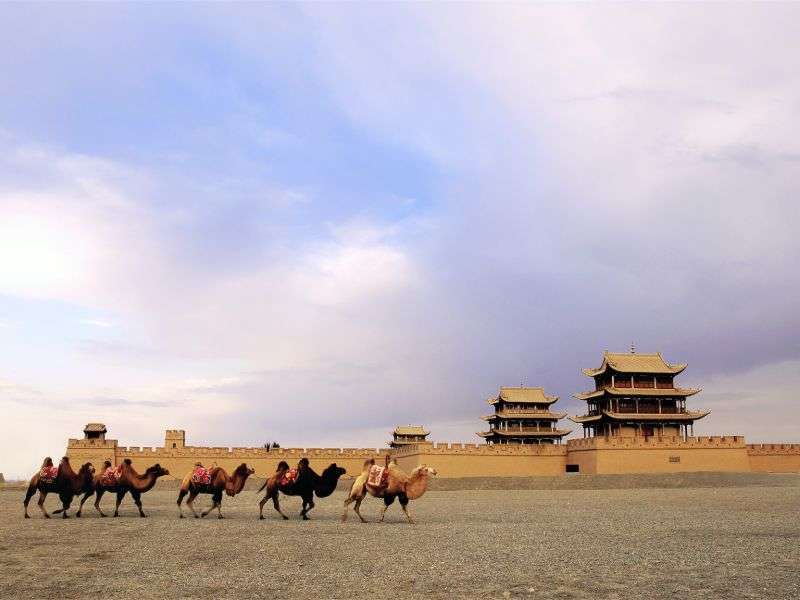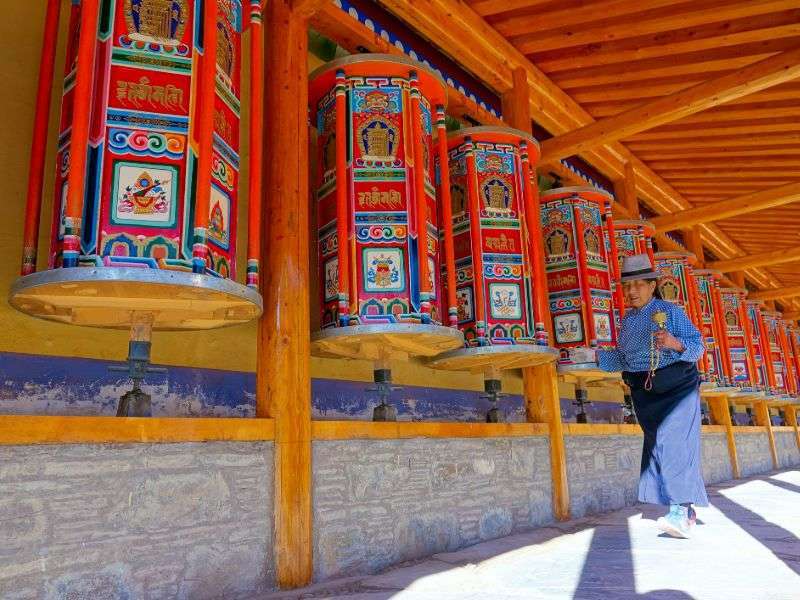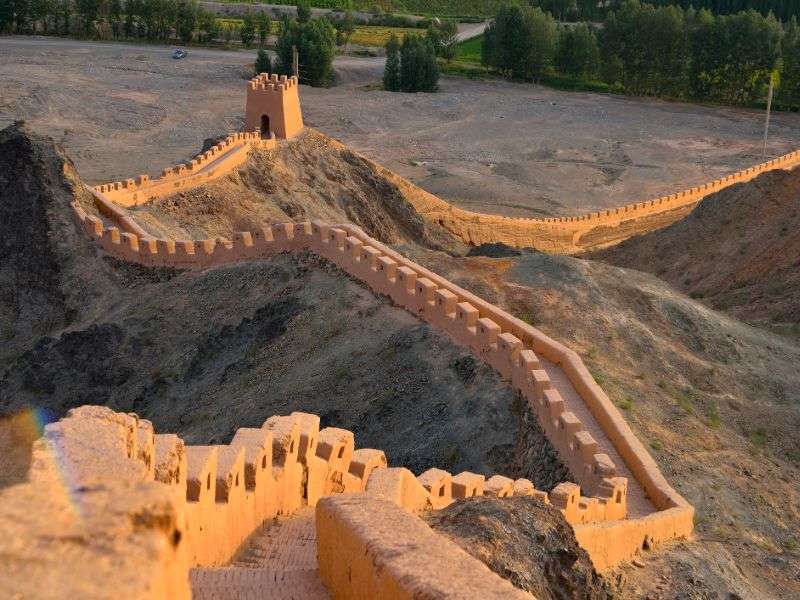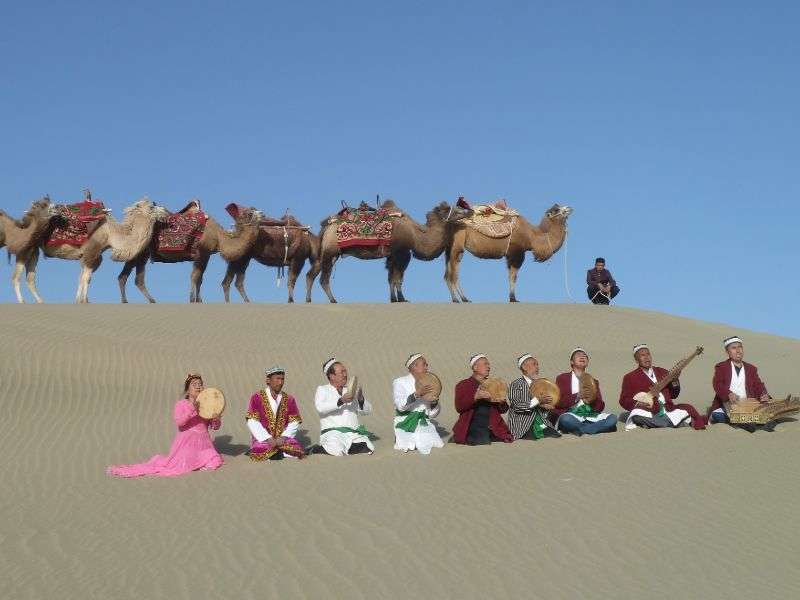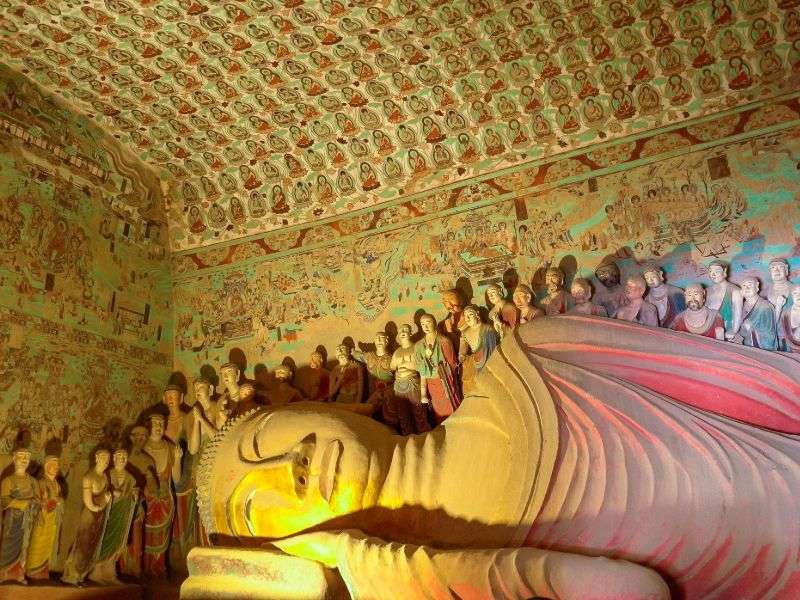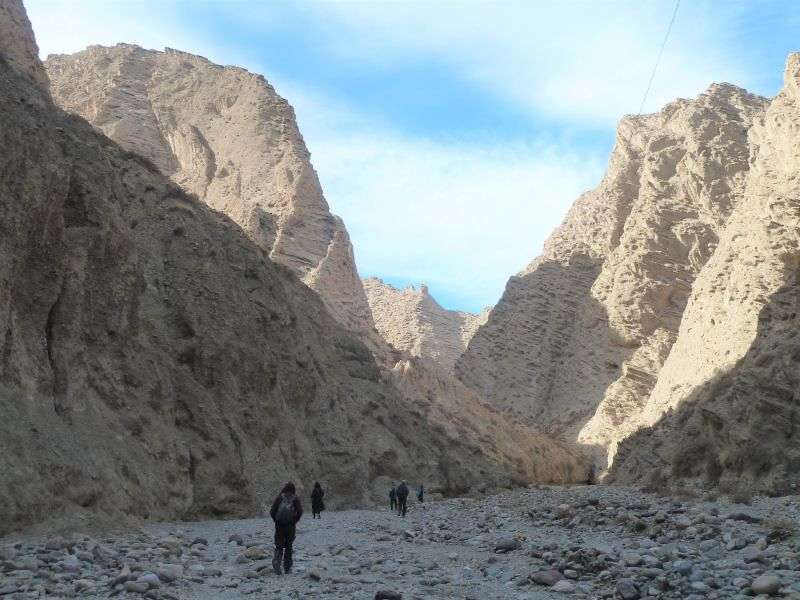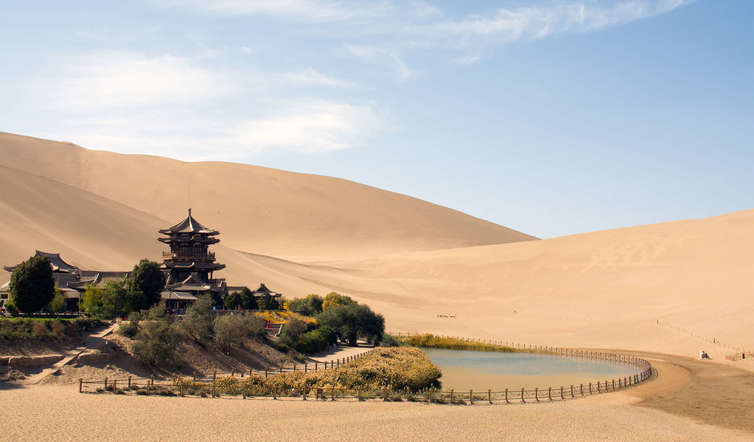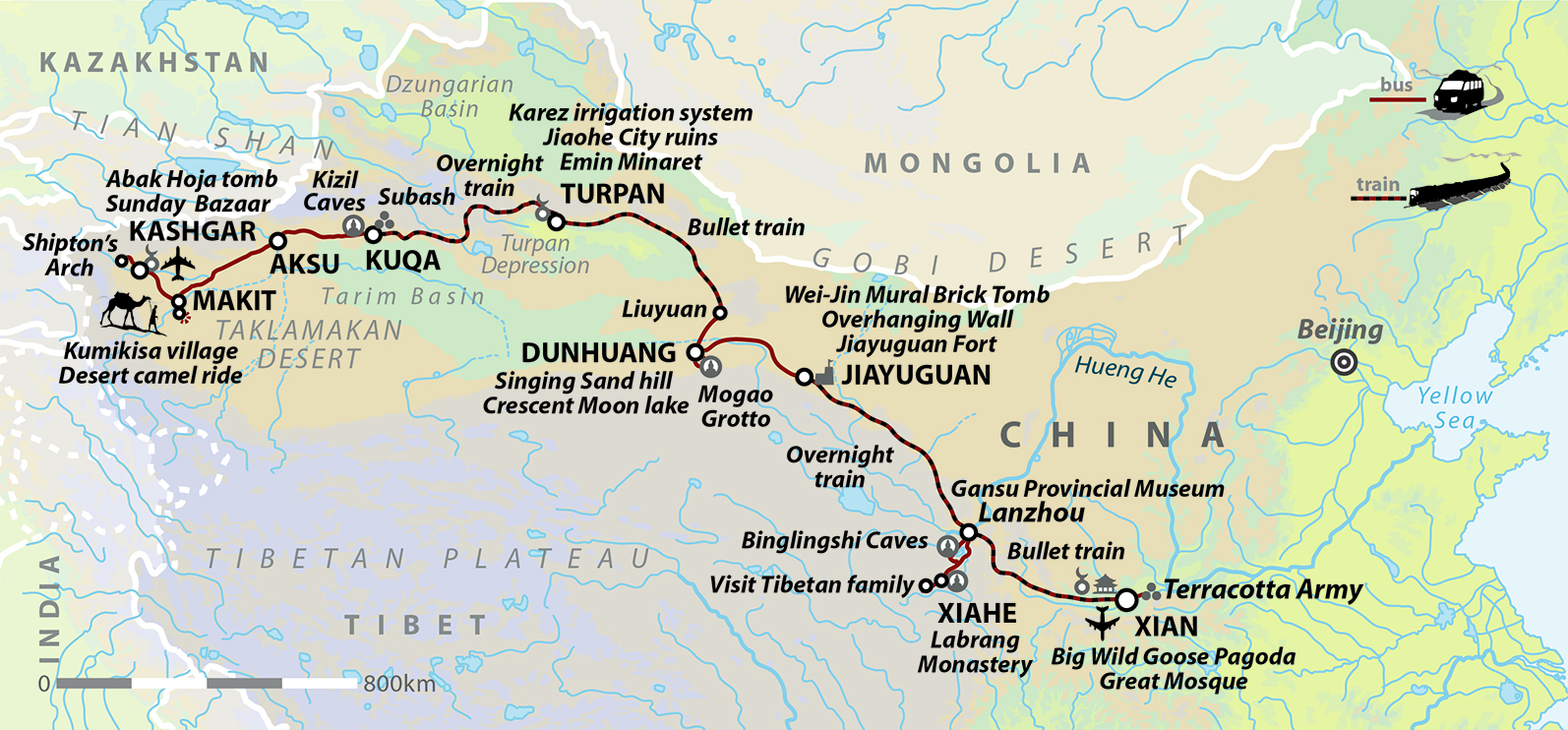Chinese Silk Road Taklamakan Adventure
Chinese Silk Road Taklamakan Adventure
$6413
Chinese Silk Road Taklamakan Adventure
18 Days Starting in XI'AN and ending in KASHGAR
Visiting: Xi'an, Lanzhou, Xiahe County, Jiayuguan City, Dunhuang, Turpan, Kuqa, Xinjiang, Aksu Prefecture, Makit County, Kashgar Prefecture
Tour operator:
Tour code:
CTK1
Guide Type:
Fully Guided
Group size:
4 - 12
Age range:
1-99
Special diets catered:
Vegetarians, Please contact Wild Frontiers with any specific dietary requirements
Tour operated in:
EnglishTrip Styles:
Interests:
Private Available:
Request A Private Tour
Tour Overview
The Silk Road has long passed into lore and legend. Connecting China with the unknown lands to the west, it once spanned great swathes of Central Asia, crossing nearly 6,500 kilometres of burning deserts and high mountain passes. This exceptional adventure takes us through some of the most culturally and geographically diverse landscapes along the Chinese section of the Silk Road; travelling through the harsh Taklamakan Desert to pick up both the more regularly travelled northern route, as well as the less travelled southern section.
We’ll begin in Xian, home to the fabulous Terracotta Warriors and the easternmost point of the Silk Road, before moving on to explore the ancient cities that lay along its course. Along the way we will visit Tibetan Monasteries and ancient ruins, take in the Great Wall at Jiayuguan and explore the ancient Buddhist caves at Dunhuang. We continue on to Turpan, one of the lowest points on earth, and famous for its backdrop of the Flaming Mountains. Our journey then continues through Kuqa to Makit for us to enjoy a desert experience.
Our tour finishes in the fabled town of Kashgar – the meeting point of both northern and southern routes - and the end of this remarkable odyssey.
Highlights
Itinerary
Day 1: Tour Starts In Xi'an
Location: Xi'an
Accommodation: Hotel
Accommodation Name: Hotel Grand Dynasty or similar
Meals Included: Dinner
After a quick freshen-up, you may wish to explore the local area and have lunch in one of the many restaurants before the tour starts this evening in the fabled city of Xi’an, once considered to be amongst the greatest cities in the world and the easternmost point of the Silk Road.
Day 2: In Xi'an
Location: Xi'an
Accommodation: Hotel
Accommodation Name: Hotel Grand Dynasty or similar
Meals Included: Breakfast, Lunch, Dinner
We have the whole day to explore this ancient city today. We will take in the Wild Goose Pagoda, formerly the Temple of Great Maternal Grace, a well-preserved ancient building and a holy place for Buddhists. We’ll also head to the old town where we will be able to see the massive city walls, which are 14km in length and up to 12m high, enclosing the historic centre. We’ll wander through the narrow streets of the Muslim Quarter and visit the Great Mosque, one of the oldest, largest and best-preserved Islamic mosques in China.
Day 3: Terracotta Army; Bullet Train To Lanzhou
Location: Lanzhou
Accommodation: Hotel
Accommodation Name: Hotel Legend or similar
Meals Included: Breakfast, Lunch, Dinner
A highlight of any visit to Xi'an is a visit to see the Terracotta Warriors – one of the greatest archaeological finds of the last century. Amazingly nothing was known of the existence of the life-size soldiers of the Terracotta Army until a peasant digging a well in 1974 stumbled upon them. The Emperor Qin Shi Huang Di spent most of his life until his death in 210BC constructing his burial place, conscripting thousands of people to build his tomb and the terracotta army that would guard him in the afterlife. The underground battle formations of life-sized pottery warriors, archers, horses and chariots have been left in situ in three large excavated pits. Pit number one contains over 6000 soldiers, each with its own individual facial features, and pit number two contains almost a thousand warriors and half the number of horses (also life-size). Later in the day we’ll return to Xi'an to board an early evening bullet train heading west and arriving in Lanzhou where we’ll overnight.
Day 4: Lanzhou - Xiahe
Location: Xiahe County, Lanzhou
Accommodation: Hotel
Accommodation Name: Nirvana Hotel or similar
Meals Included: Breakfast, Lunch, Dinner
The capital of Gansu Province, Lanzhou was once an important link along the Northern Silk Road and a major crossing point of the Yellow River. Today it provides us with our gateway into the culturally rich landscapes of the Qinghai-Tibetan Plateau. Our first stop is at the Gansu Provincial Museum which exhibits over 350,000 artefacts of Buddisht Art, Fossils, Pottery and Silk Road Civilisation. We then continue on to Xiahe by road. Home to the famous Labrang Tibetan Buddhist Monastery, one of the largest outside Tibet, the town of Xiahe sits alongside the Daxia River, amidst a rural mountainous landscape populated largely by ethnic Tibetans.
Day 5: In Xiahe
Location: Xiahe County
Accommodation: Hotel
Accommodation Name: Nirvana Hotel or similar
Meals Included: Breakfast, Lunch, Dinner
One of the six great monasteries belonging to the Geluk (Yellow Hat) school of Tibetan Buddhism, Labrang Monastery was founded in 1790 by the first Jamyang Zhaqypa, Ngawang Tsondru. Situated at the intersection of four major Asian cultures - Tibetan, Mongolian, Han Chinese and Chinese Muslim, during the 20th century it was one of the largest Buddhist monastic universities in the world. Located at the foot of the Phoenix Mountain, the monastery boasts a collection of Buddha statues that number in their tens of thousands and is still an important pilgrimage site for Buddhists across the region, with the largest number of monks in residence outside the Tibet Autonomous Region. We’ll have the whole day to explore this fascinating place as well as the nearby Xiahe Nunnery.
Day 6: Xiahe - Lanzhou; Overnight Train To Jiayuguan
Location: Lanzhou, Xiahe County
Accommodation: Overnight Train
Accommodation Name: Overnight Train
Meals Included: Breakfast, Lunch, Dinner
Returning to Lanzhou today, we catch the onward train to Jiayuguan, where we will find the first pass at the western end of the Great Wall. Before taking our train we will pay a visit to the Binglingshi Caves on the Yellow River, which have Buddhist carvings dating back over 1500 years. The overnight journey will be in soft sleeper class compartments, arriving in the city of Jiayuguan early tomorrow morning.
We will be using 4 berth cabins.
You might be sharing with others in the group or other travellers on the train.
Day 7: Arrive Jiayuguan
Location: Jiayuguan City
Accommodation: Hotel
Accommodation Name: Jiayuguan Holiday Plaza Hotel or similar
Meals Included: Breakfast, Lunch, Dinner
Arriving in Jiayuguan early this morning, we transfer to the hotel first to check in, after which the rest of the morning is free to relax at leisure. Later we’ll drive out of the city to visit the Overhanging Wall, located just a short distance to the northwest of the city’s famous fort. Located at the foot of the Black Mountains, this section of wall forms part of the defensive ramparts that once protected the extreme western edge of China. A mix of partially restored fragments and original wall, today it provides an excellent venue for a walk, providing some stunning views out across the barren emptiness of the surrounding countryside. We’ll also visit the Wei-Jin tombs that date back to 220-420 AD. Inside the tombs we can see some of the original wall paintings, depicting various social activities such as fishing, farming, hunting and drinking, including a very controversial depiction of ancient Chinese using knives and forks.
Day 8: Jiayuguan - Dunhuang
Location: Dunhuang, Jiayuguan City
Accommodation: Hotel
Accommodation Name: Silk Road Dunhuang Hotel or similar
Meals Included: Breakfast, Lunch, Dinner
Jiayuguan marked the western end of the Great Wall and today it is still a symbol of the western boundaries of China. It is located at the end of a strip of land known as the Hexi Corridor. In ancient times Jiayuguan was known as the 'mouth' of China while the Hexi Corridor was referred to as the 'throat'. Jiayuguan Fort is one of the quintessential images of western China and was built in 1372 to guard the pass between the snow-capped Qilian Shan and Hei Shan peaks. It is a splendid construction and has been considered the last outpost of the Chinese Empire since the days of the Han Dynasty, when the Great Wall reached as far as the Yumen Pass, about 90km northwest of Dunhuang, our next destination.
Day 9: In & Around Dunhuang
Location: Dunhuang
Accommodation: Hotel
Accommodation Name: Silk Road Dunhuang Hotel or similar
Meals Included: Breakfast, Lunch, Dinner
Dunhuang was once a very important staging point, and the last stop for the camel caravans before the gruelling journey through the desert. It was from here that the Silk Road divided into its northern and southern routes. Dunhuang's fame, however, is largely due to the Mogao Grottoes, which are one of the world's richest treasure troves of Buddhist manuscripts, wall paintings and statues known as the Thousand Buddha Caves. The site was first carved out of the cliffs in 366 AD, with more caves being hewn out of the rock up until the 14th century. The honeycomb of caves runs along the cliff face and contains some 2,415 coloured clay sculptures and more than 45,000 square metres of mural paintings. Many of these were paid for by pious travellers facing the perilous journey across the vast desert, or as thanks upon their safe return to Dunhuang. The colours have remained lively due to the extremely dry climate, but natural and electric light and the humidity caused by the breath of thousands of visitors is slowly fading the precious art, and some of the caves are periodically closed. About 25-40 caves are open to the public at any one time and although guides carry a torch, it is also a good idea to take your own.
Day 10: In & Around Dunhuang; Afternoon Train To Turpan
Location: Turpan, Dunhuang
Accommodation: Hotel
Accommodation Name: Mercury Downtown Hotel or similar
Meals Included: Breakfast, Lunch, Dinner
Early in the morning we’ll head out to a wonderfully iconic spot – the singing sand dunes of Crescent Moon Lake. Here we can climb to the top of the enormous dunes for amazing views of the crystal-clear spring hidden amongst the sands, and enjoy the stunning views of the sunrise in the desert. We then return to the hotel to freshen up and have a leisurely morning. After having an early lunch in town, we will transfer to nearby Liuyuan to catch a train to Turpan where we stay the night.
Day 11: In & Around Turpan; Overnight Train To Kuqa
Location: Turpan, Kuqa, Xinjiang
Accommodation: Overnight Train
Accommodation Name: Overnight Train
Meals Included: Breakfast, Lunch, Dinner
Turpan is one of the lowest places on earth, where rain never falls and summers can be scorching hot. It was once an important staging post on the Silk Road and its large oasis produces the best grapes in China. Here we can see the ancient karez system of irrigation whereby the melted snow from the surrounding mountains is brought down to the town in underground channels, all dug by hand and stretching some 3000km. This is similar to the Arab falaj system or the Iranian qanat. We’ll also visit the 18th Century Emin Minaret built in Afghani style. During our time here we’ll visit the fascinating ghost city of Jiaohe, the ancient capital of the Jushi people, a city founded in the 2nd century BC but abandoned in 14th century AD, following its destruction by the Mongols. It stands on an isolated plateau and has a haunting silhouette and atmosphere. Among the ruins are remains of a large Buddhist stupa and headless stucco figures are set in niches adorning the central part of the main temple. From here we take our final overnight train all the way out of Gansu Province into Xinjiang, once known as Chinese Turkestan. On this train we will be using 4 berth cabins.
You might be sharing with others in the group or other travellers on the train.
Day 12: In & Around Kuqa
Location: Kuqa, Xinjiang
Accommodation: Hotel
Accommodation Name: Kuqa Grand Hotel or similar
Meals Included: Breakfast, Lunch, Dinner
This morning we arrive in the Uighur town of Kuqa, part of an ancient Buddhist kingdom that was located along a branch of the Silk Route that ran across the northern edge of the Taklamakan Desert. Birthplace of the 4th Century linguist Kumarajiva, one of Chinese Buddhism’s most revered scholars, it prospered from the wealth of the trade caravans. Huge monasteries were built here and during the Tang dynasty it was one of the ‘Four Garrisons’ of An-hsi, the ‘pacified west’. The extensive ruins of the ancient capital (Subash) lie to the north of modern Kuqa. On arrival we’ll make a tour of the city, taking in the 2nd and 3rd Century ruins of Subash, as well as parts of the old town.
Day 13: Kuqa To Aksu
Location: Aksu Prefecture, Kuqa, Xinjiang
Accommodation: Hotel
Accommodation Name: Hongfu Jinlan Hotel or similar
Meals Included: Breakfast, Lunch, Dinner
Leaving Kuqa this morning we head west towards the famous Kizil Thousand Buddha Caves. Dating back to the 5th and 6th Centuries, this remarkable series of caves are said to be the earliest major Buddhist cave complex in China, older even than those at Mogao. Filled with frescoes and sculptures, the caves have been linked to the ancient Tocharian Kingdom and of the original 235 caves, some 135 remain still relatively intact. After our visit we then continue on to the oasis city of Aksu on the northern edge of the Tarim Basin. Lying at the crossroads of trade routes, the city was fought over for centuries by the Chinese Tang, the Tibetan Tufan and the Uighurs, before falling to the forces of Genghis Khan in 1208.
Day 14: Aksu - Makit
Location: Makit County, Aksu Prefecture
Accommodation: Hotel
Accommodation Name: Makit Hotel or similar
Meals Included: Breakfast, Lunch, Dinner
Leaving early this morning, we take the Taklamakan desert road to Makit County, situated amongst one of the most arid and desolate climates anywhere on earth. The Taklamakan covers an area of some 337,000 square kilometres and translates as ‘The Desert of Death’ or ‘The Point of no Return’. One of the highlights of our journey, today’s drive takes us through just a small portion of this incredible landscape, offering a chance to experience for ourselves something of the harsh reality that faced the caravans of old as they made their way towards the markets of Yarkent and Kashgar. We will explore Kumikisa Village and then take our own ‘ships of the desert’ – the camel – and ride into the desert to enjoy the remote beauty of this area.
Day 15: Makit - Kashgar
Location: Makit County, Kashgar Prefecture
Accommodation: Hotel
Accommodation Name: Qinibagh Hotel or similar
Meals Included: Breakfast, Lunch, Dinner
After breakfast we will continue across the Taklamakan Desert to Kashgar, an oasis city with approximately 500,000 residents. Kashgar’s Old Town is a traditional Islamic city, though much of it has sadly now been destroyed by the Chinese. Kashgar sits today, as it has done for centuries, at a major crossroads of trade routes. We will of course see the somewhat controversial statue of Chairman Mao in the city centre, as well as visiting the green-tiled Abak Hoja tomb in the quiet suburbs. We visit the huge Id Kah Mosque, one of the largest mosques in Central Asia, is located in the heart of the city. There will be ample time for personal exploration of this ancient Silk Road city.
Day 16: In Kashgar
Location: Kashgar Prefecture
Accommodation: Hotel
Accommodation Name: Qinibagh Hotel or similar
Meals Included: Breakfast, Lunch, Dinner
This morning we will leave this bustling city for a few hours and head towards the Irkeshtam pass to visit Shipton’s Arch. This amazing natural rock arch is named after Eric Shipton, who served as the British consul in Kashgar in the 1940s. He visited the arch in 1947 and wrote about it in his book, Mountains of Tartary. Shipton’s Arch is often considered to be the highest in the world, though its exact height depends on how it’s measured. For many years, Shipton’s Arch was forgotten by the outside world, though it was brought back to the world’s attention in May 2000 with a National Geographic expedition. We will hike up the gorge and then climb to the arch, where we will be rewarded with spectacular views across the Tien Shen mountains.
Day 17: In Kashgar
Location: Kashgar Prefecture
Accommodation: Hotel
Accommodation Name: Qinibagh Hotel or similar
Meals Included: Breakfast, Lunch, Dinner
This morning we will visit the famous Yakshambe Bazaar, or the Sunday Market as it’s otherwise known. Here we spend the morning watching the locals trade everything from woodwork and iron wear to sheep, donkeys, cattle, horses and camels. The afternoon will be free to explore the city or maybe take a cup of tea in one of the old chaikhanas, watching the locals going about their everyday lives in the street markets.In the evening we will regroup to head out for our final night in China.
Day 18: Tour Ends In Kashgar
Location: Kashgar Prefecture
Meals Included: Breakfast
The tour ends after breakfast.
What's Included
-
MEALS
17 x Breakfasts16 x Lunches17 x Dinners
-
TRANSPORT
On this tour we will use minibuses & trains.
-
GROUP SIZE
Maximum: 12
-
CARBON CONTRIBUTIONS
Contributions to climate and community projects for all bookings
-
EXPERT TEAM
The full services of a Wild Frontiers Tour Leader with local guides where appropriate
-
ACCOMMODATION
All accommodation as outlined in the itinerary
-
ENTRANCE FEES
All entrance fees for sights mentioned in the itinerary
-
FITNESS RATING
Low / Moderate
What's Not Included
-
We believe in a completely transparent approach to pricing with no hidden extras. As such, please note that the following are not included in the cost of the tour.Visas & Travel Insurance: Visas will always be tourationality dependent but travel insurance is mandatoryTips: Always optional but some guidance will be given in the pre-departure information documentsInternational .Flights: Please ask us for an obligation-free quote for flights which originate in the UKAirport .Transfers: We include complimentary transfers if arriving/departing on the suggested group flights.Beverages & any costs of a personal nature: This will include items such as laundry and souvenirs
-
ExcludedItem
We believe in a completely transparent approach to pricing with no hidden extras.
As such, please note that the following are not included in the cost of the tour.
Visas & Travel Insurance: Visas will always be tour
ationality dependent but travel insurance is mandatory
Tips: Always optional but some guidance will be given in the pre-departure information documents
International Flights: Please ask us for an obligation-free quote for flights which originate in the UK
Airport Transfers: We include complimentary transfers if arriving/departing on the suggested group flights
Beverages & any costs of a personal nature: This will include items such as laundry and souvenirs
Visas
Visas are necessary for many of the destinations we travel to and while we aim to provide you with the most up-to-date information, requirements frequently change and as such for the latest advice we advise that you check with the relevant embassies or contact our recommended visa agency, Travcour www.travcour.com
For this tour UK passport holders currently require a visa for China.
Non-UK passport holders or non-UK residents should contact the relevant embassies for individual requirements.
Further details will be sent out to you on booking, however ensuring that correct and valid visas are obtained remains the sole responsibility of the client.
Key Aspects to Consider
Anyone in a reasonable state of health, with an open mind and a sense of adventure should be perfectly able to cope with this tour, as many of the activities are optional. However, please note that although this is not a physically demanding trip, it is a BIG journey including two overnight train journeys and as such can be tiring.
Responsible Travel
With local people, culture and eco-systems in mind, responsible travel and sustainable tourism are at the core of Wild Frontiers. We believe that a successful trip not only delivers a unique and unsurpassable journey for our travellers but also benefits the people and places we visit.
When designing our tours, we actively seek out experiences that have a positive impact on the communities and precious environments we visit - from supporting social enterprises; resting our heads in rural homestays; and eating at locally owned restaurants; to helping fund conservation projects that protect wildlife and their habitats.
Visit the Responsible Travel area of our website to read more, including the work of the Wild Frontiers Foundation through which we fundraise to aid community empowerment and education projects.
Travelling Solo
As a company approximately 70% of our clients are solo travellers, so it’s very unlikely you’ll be alone!
Our prices are typically based on twin-share accommodation but single supplements are not compulsory for any Wild Frontiers tour. If you prefer not to pay a single supplement we’ll pair you with someone else of the same sex for you to share with throughout the trip.
On this trip, if you do opt to pay for a single supplement then please note that it will cover you for all nights of the tour apart from those when we are on an overnight train where we typically use 4 berth cabins.
Please note that paying a single supplement entitles you to lone occupancy of a single room. In many cases these rooms will be of the same size as a double/twin room, but in some cases they may be smaller.
Insurance
Insurance that provides cover for emergency repatriation in case of a medical emergency is compulsory for all tours. You should be aware that due to some of the geographical areas visited and some of the activities included on certain of our trips some standard insurance policies may not always provide adequate cover. As such we strongly recommend that you purchase a policy that adequately covers your trip. Please see the Insurance section for more details.
Check out our Q&As
-
Are airport transfers included in this tour?
We include complimentary transfers if arriving/departing on the suggested group flights
-
Are the local guides on the tour English speaking?
Yes
-
What is the maximum group size?
12
-
Do you require a visa for this holiday?
For this tour UK passport holders currently require a visa for China.
Non-UK passport holders or non-UK residents should contact the relevant embassies for individual requirements. -
What policies are in place for Covid-19?
We have a complete Covid-19 hub here: https://www.wildfrontierstravel.com/en_GB/covid-hub
-
Do you operate a “single share” option and how does it work?
Over 70% of passengers on our group tours are solo adventurers. Unlike many tour operators, we don’t believe in charging solo travellers a premium, so if you are happy to share a room with a fellow traveller of the same sex, you will pay exactly the same as a couple..Occasionally you may even end up with your own room. You can travel as a single traveller on any of our holidays, from our escorte
-
Will the accommodation included meet local health and safety regulations?
Yes
-
How long has the tour company been trading?
Since 2002
-
Do I need to be double-vaccinated against Covid-19 to travel with you?
In most cases, yes. Not only are many destinations making double-vaccination a requirement of entry to the country and/or access to restaurants, museums etc., but additionally on all our group tours for the foreseeable future, for everyone’s peace of mind, we are asking that all clients be double vaccinated.
Reviews from travellers on this tour
Want a private tour?
-
Personalise your trip
Make changes to the itinerary, accommodation, or transport method
-
Travel more exclusively
Your tour guide can focus all their attention on your group
-
Travel for a special occasion
Celebrate an important event by only travelling with your friends or family
1 Select your preferred date
Friday - Monday
Oct 09, 2026 - Oct 26, 2026Book with Confidence
-
Low Deposit
Wild Frontiers requires a minimum deposit of 10% or the full booking value, whichever is less, with the final balance not due until 70 days before departure.
